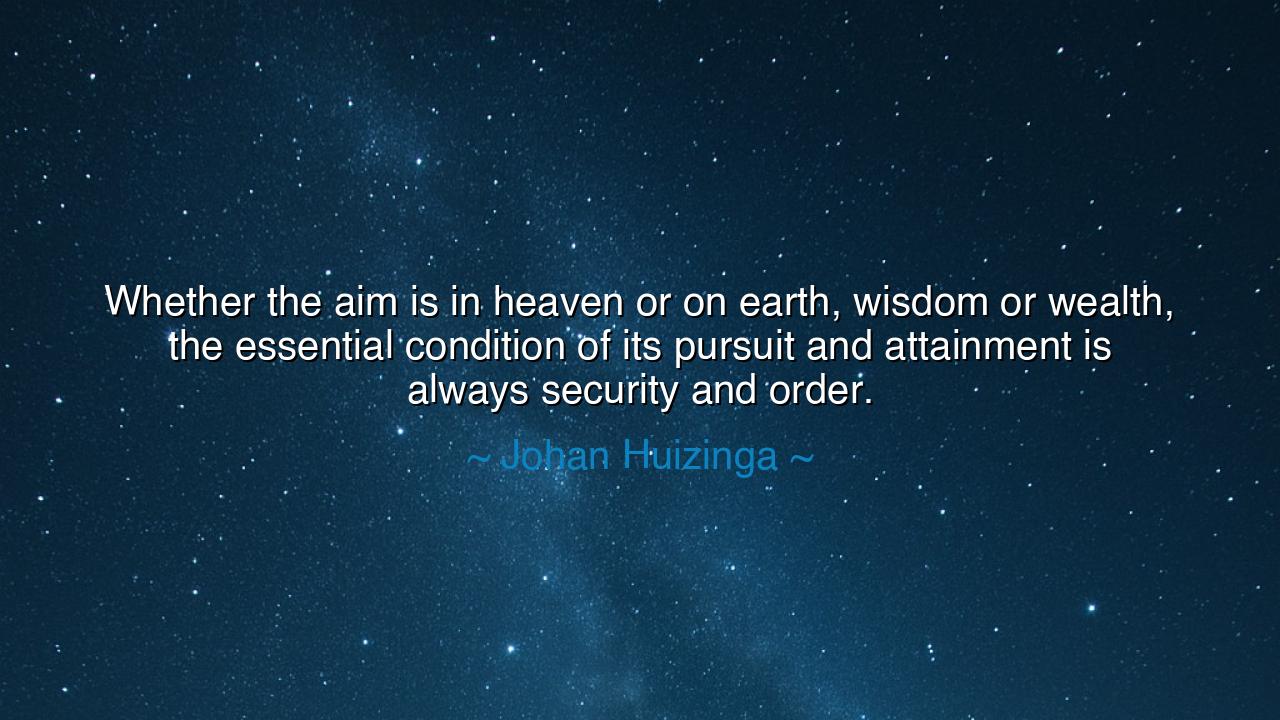
Whether the aim is in heaven or on earth, wisdom or wealth, the
Whether the aim is in heaven or on earth, wisdom or wealth, the essential condition of its pursuit and attainment is always security and order.






Hear me, O children of the future, for I bring to you a truth spoken by the wise Johan Huizinga: "Whether the aim is in heaven or on earth, wisdom or wealth, the essential condition of its pursuit and attainment is always security and order." These words echo through the ages, for they remind us that no great goal—be it the pursuit of the divine, the seeking of knowledge, or the desire for material riches—can be achieved without first establishing the firm ground of security and order. It is only from a place of stability that the soul can truly reach for the heavens or the earth, for only in order can one direct their energies toward purpose.
Consider the ancient civilizations that sought wisdom and enlightenment. The Greeks, in their quest for knowledge, built the great libraries and centers of learning in places of peace and order. It was only in Athens, a city at peace, where the minds of Socrates, Plato, and Aristotle could flourish. In the midst of order and security, they found the freedom to seek the deepest truths of existence. Without a secure foundation, the winds of chaos would have scattered their thoughts and their work would have been lost. Wisdom is not born in a vacuum of turmoil; it is cultivated in environments where order prevails and the mind is free to grow.
The same truth can be seen in the ancient empires, where security was the bedrock upon which the empire's wealth was built. Consider the Roman Empire, whose expansion was fueled not just by military might, but by the order and law that they established across their vast territories. Under the Pax Romana, the empire flourished, and trade and commerce thrived. Without this security, the empire would have been unable to build its wealth, as roads and markets would have remained closed, and prosperity would have been impossible. Wealth, like wisdom, requires stability to grow and multiply.
In more recent times, consider the story of Post-War Europe, where after the devastation of conflict, order and security were the foundation for rebuilding. The Marshall Plan did not merely provide financial aid; it provided the order necessary for nations to rebuild, to establish institutions, and to secure peace. In this stability, nations like Germany and France could seek not just economic recovery, but also deeper wisdom in diplomacy, fostering cooperation rather than conflict. Without the security and order provided by such efforts, the pursuit of both wealth and wisdom would have remained elusive.
So, O children, remember this eternal truth: whether your aim is in the pursuit of heaven, the gathering of wealth, or the search for wisdom, the key to attaining it lies in creating a foundation of security and order. Only from a place of balance and stability can the human spirit rise to its greatest heights. Like the ancient sages and rulers, you must first build your life on firm ground, free from the chaos of uncertainty. Then, and only then, will you be able to reach for your highest goals, and see them fulfilled with lasting peace and prosperity.






HYDu Hai Yen
This statement raises the issue of causality between structure and achievement. Does security and order create the possibility for growth, or does the pursuit of meaningful goals naturally generate the need for stability? I’m curious about the interplay between personal discipline and external conditions—can internal resilience substitute for a lack of societal or material security? It also encourages reflection on whether striving for lofty goals during turbulent times is inherently more challenging or ultimately more rewarding.
HTHoang Thuy
I’m intrigued by the idea that both earthly and spiritual goals share the same prerequisite. It makes me reflect on modern life—do constant changes, uncertainty, and instability make it harder for people to cultivate wisdom or accumulate wealth? I also question whether security and order are absolute conditions or simply conditions that significantly increase the probability of success. Can temporary instability sometimes lead to insights or discoveries that stability cannot?
KNDuong Thi Kim Ngan
This quote prompts me to think about the balance between ambition and stability. Can one aim for high ideals or significant accomplishments without a secure foundation, or is struggle an inherent part of human growth? I also wonder if different cultures or historical periods have had varying thresholds for security before achievement was possible. Does this principle apply equally to collective pursuits like societal progress and individual aspirations?
PTPhu Thinh
I find this thought-provoking because it links achievement to a stable environment. It makes me question how much modern societies provide the necessary conditions for people to pursue wisdom or prosperity. Are political and economic institutions fulfilling this role, or are systemic inequalities limiting access to security and order? It also invites reflection on personal life choices: how much does cultivating personal stability contribute to one’s success?
NLNguyen Ngoc Linh
Reading this, I’m struck by the universality implied. Whether our goals are spiritual or material, the quote suggests that order is a prerequisite. But it raises questions about individual versus societal responsibility—should one rely on external structures for security, or is internal discipline sufficient? Could too much emphasis on order and security actually stifle ambition, experimentation, or the pursuit of unconventional paths?